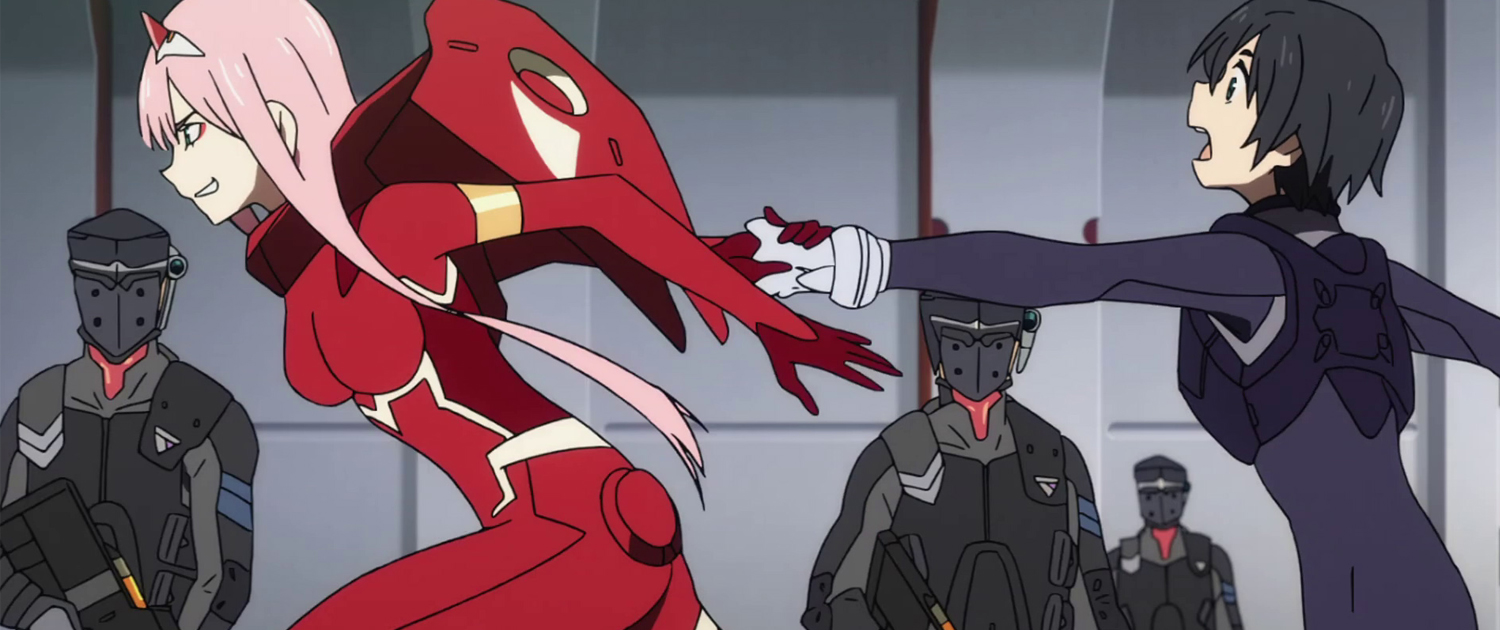Darling in the Franxx is what happens when anime has an existential crisis
80% of the dialogue in this show is Hiro screaming "ZERO TWO!"
Part slice of life, part Evangelion, Darling in the Franxx is a 24 episode giant monster/mecha anime series that attempts to, well, actually......
I don’t know what it attempts to do.
Not unlike a celebrity impersonator, on the surface Darling in the Franxx maintains the appearance of shows of a similar pedigree (See Evangelion, Eureka Seven, Gundam). However it’s when the impersonator opens their mouth to speak that the facade begins to crumble and the frail wizard behind the curtain is revealed. You see for all of its potential, at some point it had an existential crisis, waved a little white flag and didn’t quite know what to make of itself.
Seemingly, Darling in the Franxx has everything going for it: it’s a post-apocalyptic robot smash-fest with a slightly interesting setting that focuses on a team of young pilots manoeuvring the awkward and all-too-familiar throbs of puberty. As the zombie-like remnants of humanity shuffle to and fro on the surface of the scorched Earth in gigantic mobile cities, we discover that our young heroes have graduated to become the next generation of Parasites; that is, new cadets tasked with piloting highly manoeuvrable mecha called Franxx to defend the last of humankind against marauding monsters called Klaxosaurs.
While this is a lot to take in, the first few episodes of the series manages to do an incredibly good job of explaining the world to us through our original protagonist, Hiro. Introduced as a kind of moral compass, Hiro becomes the glue that keeps our team of Parasites together as the series begins to throw interesting and thought provoking scenarios at them.
For Hiro and the others, everything gets turned on its head when without warning a mysterious Franxx pilot called Zero Two (Parasites are designated numbers at birth, not names) enters the mix and immediately clashes with the young group.
Thus, teenage angst rises to the surface.
In the end this is what drives the popularity of the series: the personal relationships between the main characters and the budding romance between Hiro and the extremely horny Zero Two.
Soon enough however, what becomes clear at some point is that the focus on building interpersonal relationships envelops everything else and begins overshadowing the essential sci-fi elements that had the potential to make the series great. Exposition quickly becomes secondary to emotional response and entire episodes are dedicated to unrequited love or trying to understand specific emotions. In most anime that attempts to cater to romantic fan service this is fine, actually it’s actively encouraged, but Darling in the Franxx isn’t set in a high school or local sporting club. An entire post-apocalyptic world is being left undiscovered around them. At one point no less than three episodes in a row become ‘bottle’ episodes, a term used in writing circles to describe a type of TV trope that maximizes dialogue but minimizes plot development. Bottle episodes usually occur when writing staff are trying to stretch out show content so they cover their entire season when a narrative falls flat.
It’s around this part of the season that the entire show begins to come off the rails and gets caught in its own desire to become something else. By episode 16 it’s completely shot its wad. Like a bumbling thief climbing up a ladder to escape the police, upon reaching the top they realize that there’s nowhere else to go. This is how the second half of Darling in the Franxx feels; our favorite characters have now all been shipped, but there’s no further conflict that emerges to upset these relationships. Unfortunately this is the key factor that’s missing in taking the series to the next level and making it something grand. Older and more established space opera’s like Macross do an incredibly good job in building tension around romantic relationships without coming at the cost of plot and narrative. A good show understands that characters losing their relationships are just as important as seeing them built, because by throwing around the idea that the characters “lived happily ever after” so early in the season the audience loses the desire to stay tuned in.
This probably explains the sudden and dramatic shift in the final four episodes of the season, introducing an all new antagonist out of thin air that only aided in baffling the audience more than it succeeded in tying a bow neatly around the story.
In all it’s a series that shows us exactly what it looks like when anime has an existential crisis. By attempting to be a jack of all trades, ultimately you end up being a master of none.
This isn’t to say that Darling in the Franxx is an unenjoyable experience. The action early on in the season is quite exciting and the unique Franxx designs are definitely interesting. Shōji Kawamori mecha these ain’t, but it’s certainly a fresh take on a genre that likes to bog itself down in the intricate details of engineering. The Franxx are light, comical and more human than machine. They make interesting show-pieces, and once the model kits and toys start hitting the shelves they’ll serve as introduction points for “fan service” anime fans who may never have collected mecha figures before.
It’s definitely worth a watch, but that comes with caveats. If you don’t expect anything, you’ll probably walk away with a positive experience. Think about it too much like I did, and you end up being your own worst enemy.
Don’t take it too seriously, you’re bound to have a grand old time.
- Andrew Archer


